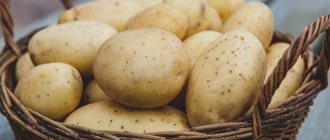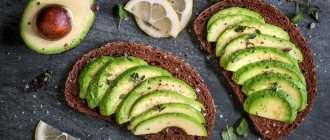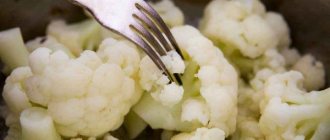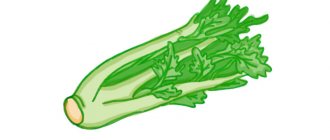Is raspberry tea allowed for a nursing mother?
During breastfeeding, the mother's diet is developed with special attention, since it should consist exclusively of healthy foods for the health of the woman and her baby.
In the first time after childbirth (about two months), you should under no circumstances eat any types of berries, since they are characterized by a high level of allergen.
You should only consume raspberries when the baby is a little older and does not have an allergic reaction.
Is it possible to eat raspberries while breastfeeding?
(1 5,00 of 5) Loading...
Fruits, vegetables and berries are the main suppliers of nutrients needed by a woman’s body after childbirth and during breastfeeding.
Raspberries during breastfeeding due to the red color of the berries are included in the list of foods prohibited for consumption. But the berries are not only tasty, they also have a number of beneficial properties.
So, maybe it makes sense not to adhere to strict restrictions, but to include fruits in the diet of a nursing woman?
Benefits of berries
The value of raspberry fruits is not only in their pleasant taste and aroma, it is the concentration of valuable substances for the body of a nursing mother. The berry pulp contains:
- vitamins of group B, PP, C;
- trace elements and minerals: potassium, copper, magnesium, iron, calcium, zinc, cobalt.
- anthocyanins strengthen capillary walls and remove harmful substances;
- coumarins reduce the level of prothrombin in the blood, normalizing blood clotting;
- salicylates are a natural antipyretic and analgesic;
- organic acids and participate in metabolic processes.
The berry also contains sugars, pectins, tannins, nitrogenous compounds, and essential oils. As a result, the rich composition of the product provides invaluable benefits to the body:
- fills with valuable components;
- cleanses blood vessels;
- eliminates toxins;
- normalizes blood clotting;
- stimulates the digestive system;
- removes excess fluid;
- helps fight fatigue and depression.
Raspberries have been used for a long time in folk medicine for colds, as a diaphoretic and anti-inflammatory agent.
Is it possible or not?
So can a nursing mother eat healthy berries, or is it better to give them up during lactation? The red color of the fruit can cause an allergic reaction in a child, especially in the first three months of life.
In addition, raspberries can provoke the development of colic during the period when the baby’s digestive system is still formed.
Therefore, in the early stages of lactation you should not include berries in your diet, even if you really want something tasty.
When the child grows up, he turns 4 or 5 months old, provided he does not have allergies, raspberries in moderation are allowed to be included in the diet of nursing women.
How to use
Raspberries are a controversial product; the baby’s first reaction largely depends on how correctly it is introduced into the diet. How to carry out the procedure correctly:
- You should start taking fresh berries in the morning with a minimum amount; for the first time, two or three fruits are enough.
- If there is no reaction the next day, you can increase the dose to a spoon, observing the appearance and behavior of the child.
- If after a few days the baby feels well, gradually increase the number of berries.
- Provided the product is well tolerated, the daily volume is 50, maximum 100 g.
If the baby has redness, he is worried or has a cough, he is bothered by bloating, raspberries are excluded from the diet, and the child is transferred to a hypoallergenic diet.
In what form is it allowed?
Which raspberries are the healthiest for a nursing mother:
- Fresh berries are the most valuable; they are frozen or dried for the winter.
- Before consumption, the fruits are doused with boiling water to prevent pathogenic flora from entering the body.
- It is not recommended for mothers to drink concentrated juices; they are allowed to prepare fruit drinks, infusions or teas from dried berries.
- Store-bought baked goods with raspberry jam are of no value in terms of health benefits; it is possible that preservatives may be added, so it is better to avoid them.
As a result of heat treatment, raspberry jam loses its vitamin composition, but does not lose its allergenic properties, so this is not the best option for breastfeeding. Salicylates retain their effect, which allows the sweetness to be used as a diaphoretic. But the boiled product contains a lot of sugar, so it is better not to try it before six months; you should start with a small spoon.
It is best to buy berries for a nursing woman from a trusted seller to be sure that harmful nitrates will not penetrate into the body along with vitamins.
Contraindications
It would seem that raspberries are a harmless berry, but not everyone can eat them:
- Due to the significant amount of sugars, it is not recommended for diabetes.
- Purines in fruits can cause harm in cases of urolithiasis and acid-base balance disorders.
- Berries are contraindicated during exacerbation of gastrointestinal diseases.
Raspberries cannot be stored for a long time; if a fermented product is used as food, colic and digestive upset may develop in mother and baby.
During breastfeeding, raspberries allow a young woman not only to recover, but also have a positive effect on her mood and well-being, and will help cope with an incipient cold without pills. But it is always important for mommy to remember that the main condition for her child’s health is moderation. After all, intemperance in nutrition can cause serious complications in the baby.
Source: https://kideat.ru/pitanie/mozhno-li-est-malinu-pri-grudnom-vskarmlivanii.html
The benefits of the drink during breastfeeding
Raspberry tea has a huge number of beneficial properties:
- Fast recovery after childbirth.
- Thanks to the presence of antioxidants, it helps maintain youthful and attractive skin, and also protects the body from cancer diseases.
- Weight loss.
- Saturation of the body with missing vitamin C.
- Improved mental state.
- Strengthening the cardiovascular system.
- Maintains eye health, particularly the retina and macula.
- The presence of ellagic acid allows you to quickly and effectively fight viral diseases.
- Proper functioning of the body of mother and child.
- Normalizing the functioning of the gastrointestinal tract.
- Removing waste and toxins from the body.
- Improving lactation, eliminating the shortage of mother's milk.
Before drinking raspberry tea, you can do a small test. To do this, eat a few raspberries at the beginning of the day, but if in the evening the baby does not experience any manifestations of an allergic reaction, then you can safely include this product in your diet.
Chemical composition and beneficial properties of raspberries
Raspberries are a summer berry that is consumed fresh, jams and preserves are made from it, added to fruit salads, and used as a filling and for decorating desserts. It has a low calorie content (only 46 kcal per 100 g of product), which allows you to consume it without fear of gaining excess weight. But this does not mean that you can eat berries in unlimited quantities, since this can lead to an allergic reaction.
Fresh raspberries
The following substances are present in raspberry berries and leaves:
- vitamins: A, beta-carotene, group B (except B12), C, E, H, K, PP;
- minerals: potassium, calcium, silicon, magnesium, sodium, phosphorus, chlorine, iron, cobalt, manganese, copper, molybdenum.
Women often wonder whether it is possible to eat raspberries during pregnancy and during breastfeeding. This berry has the following beneficial properties:
- strengthens capillaries;
- increases the body's resistance to various diseases;
- normalizes blood clotting;
- removes signs of a cold, fights cough and fever;
- improves mood, gives vigor, eliminates stress, nervous tension and fatigue;
- improves kidney function, causing swelling to disappear;
- improves the condition of skin, hair, nails;
- reduces abdominal pain, eliminates vomiting;
- reduces the level of “bad” cholesterol;
- restores hormonal levels;
- using an infusion of raspberry leaves is effective for diarrhea;
- restores hormonal levels.
For colds, it is recommended to drink raspberry tea. It effectively combats unpleasant symptoms and improves overall well-being.
Raspberries come in garden and forest varieties. Garden berries are more healthy and safe, so it is advisable to eat them during guards.
Recipes for colds with raspberries
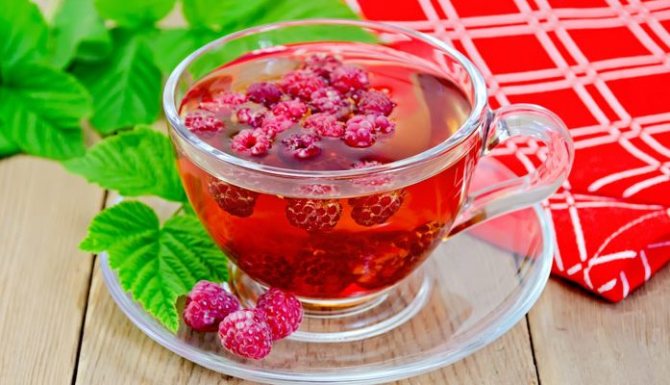
During colds, a nursing mother can use raspberries in the following ways:
- Pour 45 grams of raspberry leaves with 500 milliliters of boiling water. After the emulsion has infused, the product can be used.
- Add 15 grams of black tea to fresh raspberries. If desired, you can add some raspberry leaves. Pour 500 milliliters of boiling water over the dry mixture and let it brew, then strain.
- Prepare regular brewed tea and add raspberry jam to it. This recipe is quite simple, but is perfect for eliminating high fever due to viral diseases.
- Cut the raspberry branches into small pieces of 60 grams and fill them with 400 milliliters of hot water. Next, bring the emulsion to a boil, then simmer over low heat for about ten minutes. Infuse the product for a quarter of an hour, cover tightly with a lid, and strain.
If you don't have time to prepare raspberry-based drinks, then you can simply eat a small amount of fresh or dried raspberries.
It is recommended to drink raspberry tea no more than 3 times a day. You can also add other berries to the drink: strawberries, currants, blackberries, etc., which will improve not only the taste, but also the healing properties.
Raspberries during lactation
Raspberries during breastfeeding can really bring many benefits to both mother and baby. However, doctors warn that raspberries are among the allergenic fruits.
In order to know for sure whether you can eat raspberries or not, you just need to try them. There is no other way. You can, of course, limit yourself in everything, avoid eating any new products, but will this make your milk more valuable? No! A nursing mother should eat vitamins and, above all, she needs this. After all, the body of a young mother is greatly exhausted during pregnancy and childbirth, and constant stress, lack of sleep and physical fatigue are added to this.
If you limit yourself in the use of vitamins, you can provoke the development of serious diseases.
So, in order to determine whether your baby has an allergic reaction to raspberries, eat 2-3 fresh berries and watch your baby. Such a quantity of berries will not cause harm, but will help determine the child’s reaction.
Read also:
Is plum harmful or beneficial for mother and baby during breastfeeding?
If within 24 hours after trying raspberries, your baby does not experience any rashes on the skin or upset bowel movements, everything is fine; a nursing mother can eat raspberries in limited quantities.
Contraindications
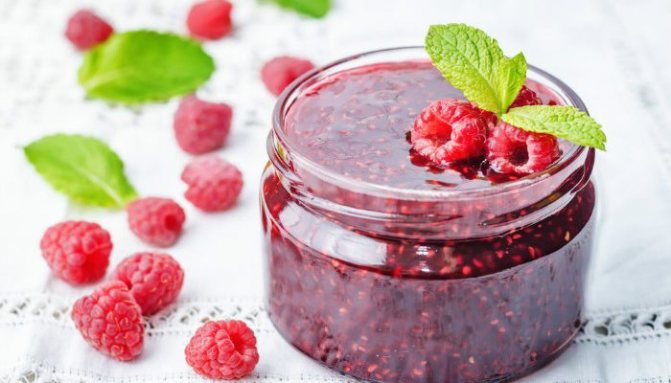
Raspberry tea is not recommended for nursing mothers in the following situations:
- Stomach ulcer.
- Gastritis and other dangerous diseases of the gastrointestinal tract.
- Excessive levels of acidity in the body.
- Diseases of the urinary system.
- Diabetes mellitus of any type.
- Allergic reaction.
- Individual intolerance.
Possible negative influences
In rare cases, drinking raspberry drink can cause certain side effects, in particular the following:
- Multiple redness on the skin.
- Rash all over the body.
- Unbearable itching.
- Allergic rhinitis.
- Disturbance of the digestive process.
- Aggravated colic.
If you notice any of these symptoms in yourself or your baby, you should immediately exclude raspberries from your diet.
In general, raspberry tea is extremely beneficial for the body of mother and baby, especially during viral diseases. At the same time, it is important to remember that you should observe moderation in consuming the drink, without adding excessive amounts of sugar to it.
Application of raspberries
With gw, you can eat raspberries not only fresh, but also add them to fruit salads, decorate desserts with them, make preserves, jams, and even cook compotes. It can also be used to prepare homemade cosmetic masks for the care of the skin of the face and neck.
Raspberry tea is good to drink for colds and to enhance lactation (1-2 cups 3-4 times a week are enough). At the same time, it is not recommended to abuse this drink and you can drink it only 2 months after giving birth.
You can dry raspberries in the sun, in a special dryer, or in the oven. After heat treatment, it retains its beneficial properties and is easier to digest compared to fresh.
Raspberry tea has a tonic, immune-strengthening and invigorating effect on the human body. It is advisable to brew the drink with natural raspberries, rather than buy ready-made tea, since it usually contains flavorings, preservatives and other harmful substances. This composition negatively affects the health of a nursing woman and baby, and in some cases can even lead to poisoning. If you don’t have fresh raspberries, you can use frozen or dried ones; twigs and fresh raspberry leaves are also suitable - this drink effectively fights high body temperature.

